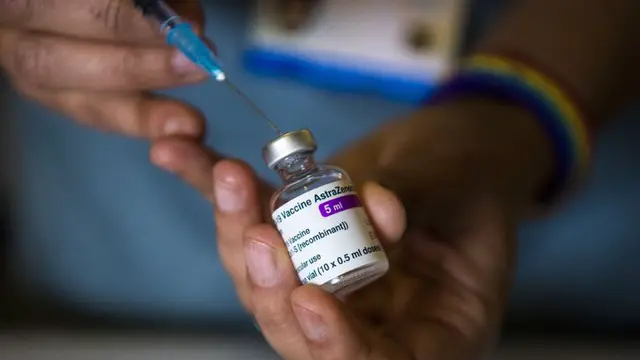AstraZeneca says it expects to release two million doses of the Oxford vaccine every week by mid-February - and has asked for its workers to get priority access to avoid COVID outbreaks hindering production.
"We've released just over 1.1 million doses, to date, and we are scaling up as we've said very rapidly. And this will happen imminently, to releasing two million doses a week, we're absolutely on track to do that," said Tom Keith-Roach, president of AstraZeneca UK.
"We're scaling up to two million a week imminently, and certainly we hope to be there on or before the middle of February," he told MPs on the Science and Technology Committee.
Meanwhile, vaccines minister Nadhim Zahawi confirmed the government is considering a 24-hour vaccination programme to meet its pledge to have the UK's four most vulnerable groups vaccinated by the middle of February.
He told MPs ministers "will absolutely look" at the measure when asked about it, adding that he is confident the government will achieve its target for next month.
The NHS needs to accelerate inoculations to reach its target to vaccinate 14 million people in just five weeks.
AstraZeneca said manufacture is a biological process that can't be accelerated, but the company is confident of supplying tens of millions of doses in the first quarter of 2021.
Its research chief also gave evidence to the committee, telling MPs his staff should get priority access to the jab.
"One of the things that I'm worried about is actually maintaining a continuous supply and work on this vaccine," Sir Mene Pangalos said.
"Of course, with the outbreak and the pandemic where it is I feel it's critical to the people that are working on this vaccine are actually immunised.
"Because if you have an outbreak at one of the centres - which we've had actually - or in one of the groups in Oxford is working on new variants, or the people that are working on the regulatory files, everything stops.
"This is a concern that I have and so again we're pushing to try and get our key workers that are working on the vaccine project immunised to try and prevent these outbreaks."
He added that current data shows that an eight to 12 week interval for the second dose of the Oxford vaccine is a "sweet spot for efficacy".
The second dose of coronavirus vaccines are now being given three months later than originally planned to ensure more people are given a first dose to help fight the UK's rising COVID-19 infection rate.
Earlier, England's deputy chief medical officer Professor Jonathan Van-Tam defended the move to prioritise first vaccinations, rather than keeping doses to deliver booster shots after three weeks.
He told LBC Radio: "We have all got older loved ones and if we want to protect as many as we can as quickly as possible, with a meaningful amount of protection, then the right strategy for us is to give the initial first dose and come back for the second when we have given more people the initial first dose," he said.
"If you have got two grandparents and you have got two vaccines, what do you do - do you give two doses to one and leave the other one with nothing?"
 简体中文
简体中文

